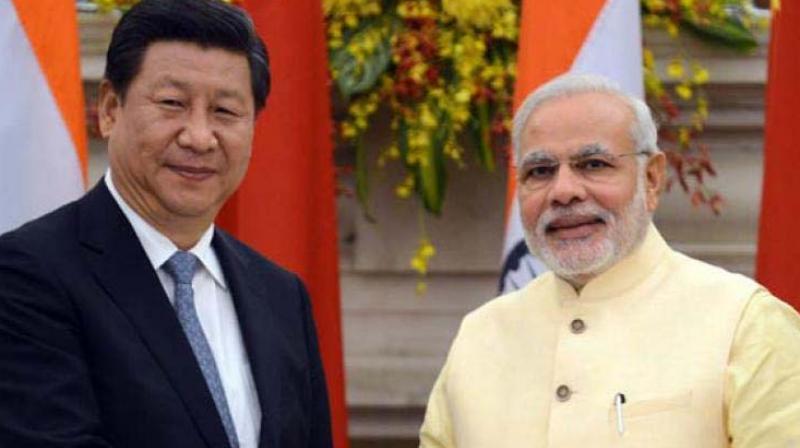Uncle Sam, an expert at manufacturing news'
It does not take long for the US to succeed in convincing the world in general about news' it seems to be concerned about.

The noise being made about prospects of a war between India and China raises questions about in which direction is diplomacy headed? Yes, though in recent past India and China have entertained cordial diplomatic ties, they have not really viewed each other as best friends.
The slogan raised about their entertaining brotherly relations, Hindi-Cheeni Bhai, Bhai was apparently just a diplomatic strategy to convince people at home and rest of the world that they were not engaged in war any more. Against this backdrop, what can be said about the noise being made nowadays about their heading for a war? The height of all this is the “concern” being voiced by the United States about prospects of this “war”.
Paradoxically, Uncle Sam’s “concern” about “prospects” of war anywhere plays a dramatic role in accelerating speculations about it really going to take place, when the reality may not actually be so. Nevertheless, it does not take long for Uncle Sam’s “concern” to receive publicity through media coverage virtually all over the world. This also prompts leaders in nations, which are supposed to be making preparations for “war”, to start voicing their apprehensions, concern and so forth regarding such a situation. In short, through the media, the stage is virtually set creating a hype for a situation that in reality may not be there.
Yes, the US may be viewed as a master in this strategy of the world in general not taking too long to believe what it wants them to believe and accept. A similar strategy was exercised when India and Pakistan chose to pursue their nuclear drives. The US was dead against their embarking on this path. And “news” was created about the two nations heading towards a mad, MAD (mutually assured destruction) drive. With the world viewing India and Pakistan as permanent enemies and the source of this “news” being the American media, the rest of the world didn’t take long to echo the same. This was, however, one issue on which India and Pakistan chose to give greater importance to their respective stands than what was propagated by the US. This is proved by their pursuing the path of nuclear diplomacy.
Undeniably, it does not take long for the US to succeed in convincing the world in general about “news” it seems to be concerned about. This is primarily because of the greater part of the world being quite dependent on the US regarding “news” about most countries in general. Most countries do not have their own news reporters and/or other sources of information in greater part of the world. Thus, there prevails the trend of their relying on what is said by the American media. And this gives the US the advantage of creating universalism about perceptions that the superpower is keen to promote regarding certain issues. What else can be said about the hype spread about the so-called Arab Spring?
Ironically, the US succeeded in a very short period of time in convincing practically the entire world about the Arab world being swept by a revolutionary fervour in favour of democracy. The so-called democratic revolution was labelled as Arab Spring. The word spring had no seasonal, regional and/or any other linkage with the countries where the democratic revolution was supposed to have begun. As is well known, the word spring has English origins. The word spring, however, was deliberately used to propagate and gain acceptability of the so-called democratic revolution in several Arab countries in the Western world. And this strategy worked. The hype created and spread about Arab Spring was echoed practically in most parts of the world, except of course the countries where the democratic revolution was assumed to be taking place.
Had an Arabic word been used, it may not have succeeded in creating “news” about countries being swept by a democratic revolution.
The word, alien to the West, would have carried little meaning for them. And therefore, the US may not have succeed in creating, that is manufacturing the kind of “news” it wanted to, regarding Arab Spring. Yes, let us accept it, Uncle Sam is an expert at manufacturing “news” to set the stage it desires regarding certain issues. The label, Arab Spring falls in the category of these terms. Not all labels succeed in staying in the limelight for too long. Within less than half a decade, speculations started being voiced about “news” regarding Arab Spring being manufactured.
Labels such as Islamic terrorism, Hindu terrorism and similar negative terms linked with non-Western world are likely to remain in use for a long time.
Even a percentage of all Hindus and Muslims are not linked with terrorism.
In essence this bears little importance for the Western world than acceptability of these terms by them and its linkage with the negative approach held by them towards the non-Western world. And this apparently is just sufficient for their media to act as a stage for propagating these and other labels.
Nilofar Suhrawardy is a senior journalist and writer. She has come out with two books Ayodhya Without the Communal Stamp and Image and Substance: Modi’s First Year in Office

